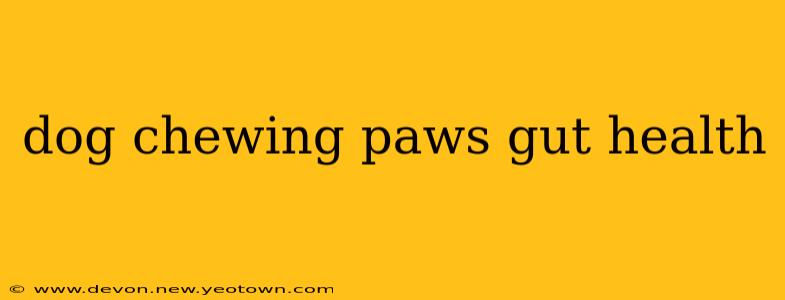Dog Chewing Paws: A Gut Health Connection? Unraveling the Mystery
My dog, Gus, a scruffy terrier mix with boundless energy, started chewing his paws relentlessly. It wasn't a fleeting behavior; it was a persistent, obsessive habit that had me worried sick. Veterinary visits yielded no immediate answers – no allergies, no parasites, no obvious wounds. Then, the whispers started: could this paw-chewing be linked to his gut health? This journey to understand the connection between a dog's gut and its paws became a fascinating (and sometimes frustrating) exploration. This article shares my experience and what I learned along the way, offering insight into this often-overlooked connection.
Is My Dog Chewing Paws Because of a Gut Problem?
This is the million-dollar question that plagued me for weeks. The truth is, there isn't always a direct, one-to-one correlation. However, an unhappy gut can manifest in unusual ways, and compulsive paw chewing is one of them. The gut-skin connection is increasingly recognized in both human and veterinary medicine. An imbalance in gut bacteria (dysbiosis) can trigger inflammation throughout the body, including the skin. This inflammation can lead to itching, discomfort, and the resulting obsessive licking and chewing.
What are the Signs of Gut Problems in Dogs?
Beyond paw chewing, other signs of digestive upset in dogs can include:
- Diarrhea or constipation: Frequent changes in bowel movements are a clear indication something isn't right.
- Gas and bloating: Excessive flatulence and a distended abdomen are common symptoms.
- Vomiting: Persistent vomiting, especially if it contains undigested food, warrants veterinary attention.
- Changes in appetite: Loss of appetite or excessive hunger can indicate underlying digestive issues.
- Weight loss or gain: Sudden weight changes, without a corresponding change in diet or activity, should be investigated.
How Can I Improve My Dog's Gut Health?
Addressing Gus's paw chewing required a holistic approach, focusing on improving his gut health. Here’s what we did:
- Dietary changes: We switched to a high-quality dog food with easily digestible ingredients, avoiding common allergens like chicken and beef. We also incorporated probiotics specifically formulated for dogs to support a healthy gut microbiome.
- Hydration: Ensuring Gus drank plenty of fresh water was crucial for optimal digestion.
- Stress reduction: We identified and addressed potential stress factors in his environment, such as loud noises or changes in routine. Stress can significantly impact gut health.
- Regular exercise: Maintaining a healthy weight and promoting a positive mood contributed to his overall well-being.
- Veterinary consultation: Regular check-ups with our veterinarian allowed us to monitor his progress and address any new concerns promptly.
Could Allergies Be the Cause of My Dog Chewing His Paws?
While gut issues can contribute to paw chewing, allergies are another major culprit. Food allergies, environmental allergies (like pollen or dust mites), and contact allergies (from certain materials) can all trigger intense itching and lead to compulsive licking and chewing. A veterinarian can perform allergy testing to identify specific allergens and recommend appropriate treatment, such as dietary changes or medication.
My Dog's Paws are Red and Swollen – What Should I Do?
Redness and swelling in your dog's paws necessitate immediate veterinary attention. This could indicate a severe allergic reaction, an infection, or another underlying condition requiring prompt treatment. Do not attempt home remedies; seek professional veterinary care.
What are Some Home Remedies for Dog Paw Chewing?
While home remedies might offer temporary relief, they shouldn't replace veterinary care. Some owners find that applying soothing balms or using protective booties can help reduce the urge to chew. However, addressing the underlying cause – whether it's a gut issue, allergy, or other medical condition – is crucial for long-term improvement.
Gus’s journey wasn’t a quick fix. It took time, patience, and collaboration with our veterinarian to address his paw-chewing and improve his gut health. The connection between the two isn't always clear-cut, but understanding the potential link is crucial for providing comprehensive care for our canine companions. Remember, if your dog is exhibiting persistent paw chewing, consult your veterinarian for a proper diagnosis and treatment plan. Don’t hesitate to ask questions; your veterinarian is your best resource in ensuring your furry friend's health and happiness.

